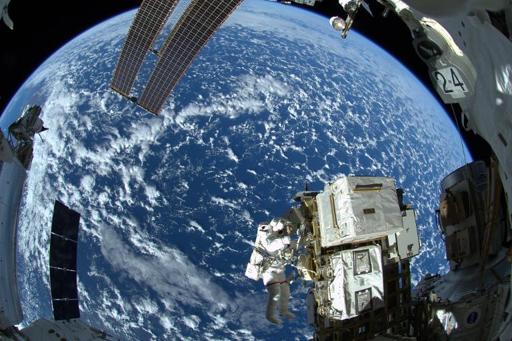Astronauts at the International Space Station rushed to take shelter early Wednesday after an alarm rang indicating a possible ammonia leak, but that may have been a false alarm, the US space agency said.
The six-member crew donned emergency masks and hurried to the Russian side of the orbiting lab after the alert at around 4 am (0900 GMT), closing the hatch to the US side behind them.
While the Russian space agency told news outlets in Moscow that the cause was a toxic ammonia leak, NASA said a closer analysis of the data pointed to a false alarm, and stressed that the crew was safe.
Mission control in Houston was leaning toward a "false indication," being at the root of the problem, Jim Kelly told US astronaut and space station commander Barry Wilmore, according to an exchange broadcast on NASA television.
A sensor problem or a computer relay issue could have led to the alarm, NASA commentator Rob Navias added.
The six astronauts taking shelter in the Russian segment have enough food for at least a week, NASA added.
"ISS flight controllers are not sure if the alarm was triggered by a pressure spike, a faulty sensor, or a problem in a computer relay box," NASA said on Twitter.
"Crew is safe. No ammonia leak confirmed. Crew responded to coolant loop pressure increases."
The problem became apparent when flight controllers in Houston "saw an increase in pressure in the station's water loop for thermal control system B then later saw a cabin pressure increase that could be indicative of an ammonia leak in the worst case scenario," NASA said on its website.
Russia's space agency blamed the evacuation on a leak of a toxic substance.
The "toxic substance was emitted from a cooling system into the station's atmosphere" in the US segment of the station, the agency said in a statement.
"At present the American segment has been evacuated and the crew is safely located in the Russian segment," the statement said.
A representative of the Russian mission control center told Russian news agencies that the substance was ammonia.
The International Space Station is a rare area of US-Russian cooperation that has not been hit by the crisis in Ukraine, which has prompted Washington to impose sanctions on Moscow.
In total 16 countries work on the ISS, whose cost is mainly shouldered by the United States.
Since NASA phased out the space shuttle system in 2011, it depends entirely on Russia to send its astronauts to the ISS.
The Expedition 42 crew had been awake for about two hours before the alarm sounded, and was at work unloading the SpaceX Dragon cargo carrier which arrived days ago with more than 2.5 tons of supplies and science experiments.























































